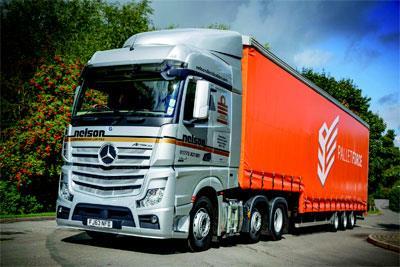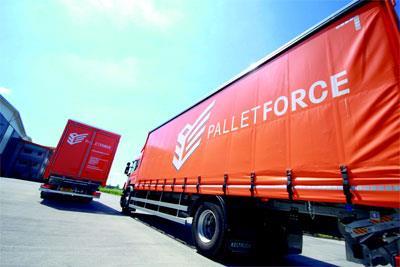
Palletforce’s recent reorganisation of its East Midlands coverage saw H Beardsley exit the network, to be replaced by Lockwood Haulage and Nelson Distribution. This is the first time these two well-established operators have joined a pallet network as Steve Hobson reports.
Palletforce is one of the UK’s leading pallet networks, covering the UK with 102 depots run by 86 member hauliers and expanding in Europe.
Nelson, based in Belper, Derbyshire, began operations in 1949 and provides warehousing and transport services from its five-acre site. Welcoming its arrival, Palletforce chief executive Michael Conroy says: "As a company that always strives for excellence, is dedicated to further growth and consistently delivers quality service, Nelson Distribution is a perfect fit with Palletforce and our members."
Simon Nelson, MD of Nelson Distribution, says: "We are entering a pallet network for the first time to enhance our service to our current clients and to allow us to tailor our services to meet the needs of traditional pallet network users."
Lockwood can trace its beginnings back to the 1960s when it began delivering in and around Derbyshire. Over the years the company has successfully developed and now operates nationwide with a large fleet of 75 modern trucks ranging from 12 tonne curtain-sided vehicles to 44 tonne articulated units.
“Lockwood Haulage is a successful and well-regarded company that is committed to quality services and shares Palletforce’s clear vision for growth based on being the best,” says Conroy. “The company is a superb addition to our membership and we are proud to have them as part of the network – especially as they are committed to developing their own business and therefore contributing to our ambitious growth strategy throughout the UK and Europe.”
Opportunity
Wayne Evans, transport director of Lockwood Haulage, says: “Joining Palletforce was a great opportunity and one we simply could not say ‘no’ to. The opportunity to take on and develop an area with Palletforce fits in with our strategy for growth and adds another service level to our portfolio.
“Traditionally we’ve perhaps been seen to offer full and part load service but we are increasingly seeing demand for deliveries across the whole range of consignments size starting from single pallet through to full loads.”
According to Simon Nelson, his decision to join Palletforce was taken after a thorough analysis of the options. He spent 16 years with Exel Logistics before it was acquired by DHL, joining the family firm in 2004. In 2008 he did a masters degree in logistics and supply chain management, basing his thesis on pallet networks.
“We approached the pallet network market in a very systematic way,” he says. “When I looked at the market, I found a lot of local hauliers were focused purely on pallet networks and by doing that a lot of relatively small businesses had survived for the last 10 years. But their margins were generally poor and their balance sheets were weak. I believe consolidation in this market will speed up in the next five years and hauliers focused purely on pallet networks will have a tough time.”
He argues that operators need to have a balanced business and not rely entirely on network volumes.
“We are involved in a pallet network in conjunction with our core contract distribution business so we have a sustainable business model,” says Nelson. “There are specific opportunities with a pallet network because quite a few pure pallet network hauliers will not survive – some do not have the credit rating to buy a bulk load of diesel.”
Competition
Evans agrees, citing the fierce competition between the UK’s nine pallet networks which has driven down rates while service levels have risen.
“Hats off to the guys who build a business purely around a pallet network,” he says. “From our perspective it is part of a balanced portfolio that also brings in other business.”
Lockwood has consolidated its business in recent years, turning its back on high volume, low margin business to focus on more profitable contracts. “We have the built the business back on a firm footing and moved from pure haulage to a storage and haulage business,” he says. “Palletforce came around at the right time for us.”
Part of this approach has been to build relationships with customers rather than sub-contracting to the big 3PLs. “There is a market out there for those guys, and we will do the odd backload for them, but we won’t go out searching for that business,” Evans says. “We would rather have a direct relationship with a manufacturer or an importer. We offer a quality service and a personal relationship so we can deliver what the customer wants.”

With his experience in 3PLs, Nelson agrees that they cannot offer the same responsive service as a smaller player.
“One advantage for Nelson and Lockwood is that the decision making process is so slow in big 3PLs,” he says. “We are agile and flexible and can make changes quickly.”
Analytical
When it came to choosing a pallet network, Nelson took an analytical approach. “When you credit check the nine or 10 hub companies they all seem fine,” he says. “The question is ‘do those nine or 10 all have quality members in each geography to provide a cohesive service?’. I would say there aren’t now and there will be even less soon.
“What attracted us about Palletforce is the membership are all quality companies with strong balance sheets who are here for the long term. My view is that some of the smaller networks could collapse, not because the hub will collapse but due to an inability to attract appropriate members.”
Evans agrees: “If you look at the Palletforce membership, there is not a single company you would not want to associate with. We also know the people – before joining we were a Palletforce customer and we have an excellent relationship with them. They were without a shadow of a doubt the best network we used.”
One key to the success of a network is balancing volumes trunked in and out of the hub, so developing sales in areas that are net outputters is important.
“With Palletforce we have the best of both worlds,” says Evans. “We have our own sales team supported by the marketing team here, and being able to offer the whole spectrum of services does open doors. It is the last piece of the jigsaw for us.
“It has already made us more efficient, as we had an imbalance of vehicles leaving the yard making local deliveries and now we have that business I am bringing vehicles back in the afternoon full with new business.
“We are sending around 85 pallets a night to the hub so we are using a couple of doubledecks and possibly a straightframe,” says Evans. “We replaced some of our older rigid box vehicles and bought five new curtainsiders – three in Palletforce livery.”
Balanced
Nelson fills one doubledeck every night and also sends a standard trailer too occasionally. “Our volumes are almost balanced with one trailer in and one out,” says Nelson. “We never envisaged the network being a huge part of the business though we aim to grow it significantly. We have taken on one extra vehicle and one extra trailer but the rest has been absorbed into our general fleet.”
Being in network now makes doing work for smaller customers viable, according to Nelson. “Before we joined, people who despatched three or five pallets a night were of no interest to us – now they are,” he says. “We are still going after contract distribution business but we can now focus on smaller accounts such as UK manufacturers or importers.”
This is especially helpful because since the recession many customers have destocked and have got into the habit of shipping smaller volumes more frequently.
“We have seen it already with existing customers,” says Evans. “Instead of delivering that full load a week we are now taking 10 pallets three times a week. The pallet networks help achieve that – provided it is a quality, reliable service.”
Palletforce’s growing European network is also generating new opportunities, says Evans.
“We have just picked up some international business from a storage customer that we would have previously given to a freight forwarder,” he says. “We can now send it via Palletforce.”
Having checked out most of the other pallet networks before joining Palletforce, Nelson is impressed with its 380,000ft2 purpose-built Burton on Trent hub that opened in 2009. “I think it is the best and it is impressive to bring customers and show them around,” he says.
For both Nelson and Lockwood, the proximity of the hub – less than 20 miles from their depots - was also a clincher. “The location is fabulous – it doesn’t get any better,” says Evans. “It is perfect,” agrees Nelson.
Palletforce has invested over £1m in its Alliance pallet management system, for which both Nelson and Evans are also full of praise. “If a customer is chasing a delivery, the old days of ringing the depot are gone,” says Evans. “We just need to look at the system and can ring the customer in confidence to tell them the delivery is on its way.”
Nelson adds: “The systems are very good – they are robust and user-friendly.”
Evans concludes: “One of the things it has brought to us is a new approach to business we already do. Through the customer focused ethos of Palletforce and Alliance it has reinforced the need to be upfront and honest with people.”













